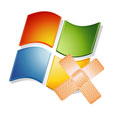
Botnet Caught Red Handed Stealing From Google
A recently discovered botnet has been caught siphoning ad revenue away from Google, Yahoo! and Bing and funneling it to smaller networks.
According to researchers at Click Forensics, computers that are part of the so-called Bahama Botnet are infected with malware that sends them to counterfeit search pages instead of the real thing. They look authentic, and with the help of DNS poisoning routines, they even display google.com yahoo.com or bing.com in the address bar. Read the full story [The Register/Dan Goodin]
















